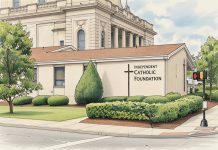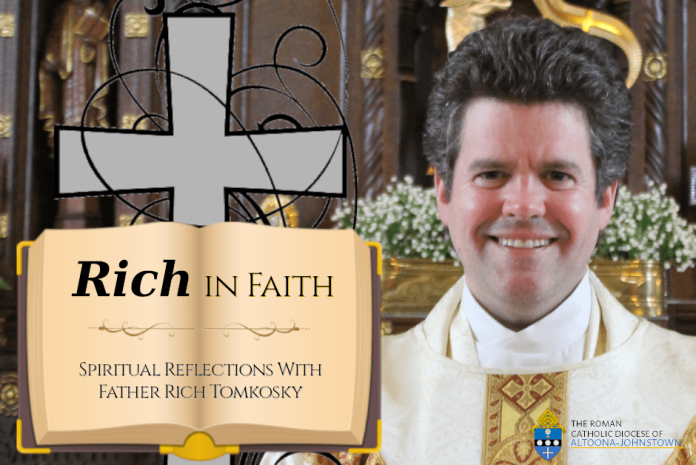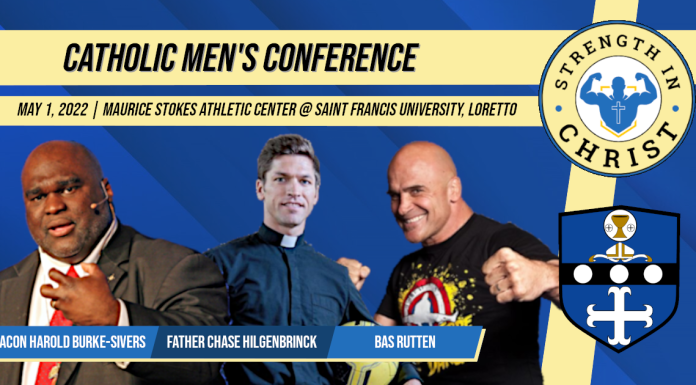By Father Rich Tomkosky
Earlier this week, we remembered our departed loved ones on All Souls Day. In the Catechism of the Catholic Church, which is the authoritative standard of what we believe and teach as Catholics, we learn about Purgatory, which is a dogma of the faith and so is not an optional belief: (1030) All who die in God’s grace and friendship, but still imperfectly purified, are indeed assured of their eternal salvation; but after death they undergo purification, so as to achieve the holiness necessary to enter the joy of heaven.
The Book of Wisdom tells us that the souls of the just are in the hand of God. We also hear in the Second Book of Maccabees in the Old Testament that it is an excellent and noble thing to pray for the dead, with the Resurrection of the dead in view (see 2 Macc 12: 43-46).
The Catholic Church includes praying for the dead as one of the Spiritual Works of Mercy. We can do this in a number of different ways: by offering Masses for the deceased person(s) (note: doesn’t have to be a Catholic – any person who has died), which is the best gift since the Mass is the most perfect prayer, by daily prayer, by offering our daily sufferings in union with Christ for them, by offering any merit or indulgence (partial or full) — especially November 2-8 visiting graves at cemetery – we obtain for their spiritual well-being.
Why do the dead need prayers? Well, because they might be in Purgatory (the very word means to be purified). When we die, our soul goes to one of three places: Heaven, Hell or Purgatory.
To go directly to Heaven, we must be a saint, meaning that we are perfectly purified and detached from all sin, big and small, and that we have made sufficient reparation for the damage our sins caused in this world.
Saints in their own unique personalities and circumstances are truly an image of Christ, in their heroic love for God and others in ALL aspects of their lives. This in reality is a far too rare occurrence. Saint Teresa of Avila who often conversed with departed souls said that “among all the souls I have seen there are only three who totally escaped Purgatory after death” (see Hungry Souls, p. 44); it is safe to say, just from realistic observation, that most people at the moment of death are NOT saints!
The only real sadness/failure/tragedy in life is not to become a saint as one great French Catholic writer Leon Bloy famously put it, for the grace is there for all of us to become a saint, but it often doesn’t occur in this life, and we can’t blame God for that but only ourselves!
Why is it that most people do not die as saints? Well, because it is hard work to become a saint! It’s one thing to know the good; it’s another thing to consistency choose it, day in and day out, in an often heroic but hidden way, within all the obstacles that daily life throws at us. This is why Jesus says in the Gospel, “By your perseverance you will save your lives.”
If we die and are not in the state serious sin (which would separate us from God forever by sending us to Hell – our own fault if it happens), but are still involved in some venial sins and/or have not been sufficiently purified of the remnants of our past forgiven sins, especially mortal ones (since sin damages and deadens our souls and our relationship with God and others), we will go to Purgatory, which is the final purification of the elect (see the Catechism of the Catholic Church: on Purgatory, par 1030-32; and on Indulgences and the temporal punishment due to sin, par 1471-73).
Remember we can be purified in this life of the temporal punishments due to our sins and avoid Purgatory all together if we truly embrace our daily Cross in love, especially the heavy crosses of serious illness most of us experience toward the end of earthly life; if we strive to die to self consistently, to live a life of daily charity toward others, to do daily mortification to make amends for our past sins (infidelity to God) and to offer it for the conversion of hardened sinners, per Our Lady of Fatima, and also the five First Saturdays devotion, and to cooperate sufficiently with God’s own initiatives to purify us, which Catholic spiritual theology calls “the passive purifications” of the senses and of the spirit (St. John of the Cross calls them the two “dark nights”).
If these things don’t occur in this life, to the degree necessary to mold us into a saint, we will go to Purgatory after death. And the great saint of Purgatory, Saint Catherine of Genoa says the soul “wants to go to Purgatory, once it encounters God in His magnificent holiness at the moment of death”, and, yes, all people, not just Catholics, if they are saved by the mercy of Christ go to Purgatory, if they need to be purified of sin and its effects.
Purgatory is the state of the cleansing or purifying fire of God’s love. Saint Catherine of Genoa says it is connected to Heaven – like a room – and there is no lock on the door – but the souls will not enter Heaven until they are spiritually ready. Once in Purgatory, the souls know they eventually will enter Heaven once they work through whatever they need to be full of God’s love, so while in Purgatory they are full of the supernatural virtue of hope and joy. Each soul is on its own unique program of purification.
Yes, Purgatory is also painful in the sense that we will truly see sin for what it is, in all its awful effects: how it truly hurt us, others, and our relationship with God. It is much better to be purified in this life because we can still gain merit and grow in charity; that cannot occur in Purgatory – our soul is set – there is no more potential for growth like on earth.
Once in Purgatory, the souls (called the Church Suffering) rely totally on the prayers and good works of others, the Church in Heaven (Triumphant), and especially on the Church on earth (Militant) to help them get to Heaven. It is God’s way of showing the souls in Purgatory the error of their ways in this earthly life, thinking they were self-sufficient (a sad fruit of sin), and forgetting that we depend on God’s grace for everything, and that everything we do affects others, either for good by virtuous acts, or evil by sinful acts. Now they, the souls in Purgatory, must depend TOTALLY on others to help them get to Heaven.
What a powerful spiritual lesson of our merciful but also just Lord. Hence for those of us still living on earth, it should motivate us to change our lives and be willing to embrace heroic virtue, so we can avoid Purgatory all together, hopefully!
What if person is now in Heaven? God will use to help other souls. Dreams of departed? Pray/offer Masses for. And remember each day to offer prayers for the dying, especially for those in the state of serious sin, throughout the world, that they accept the grace of final repentance from the merciful Lord, so they may be saved from the eternal separation of Hell. It’s their last chance at salvation! And so, it’s a good idea to daily offer the chaplet of Divine Mercy for this intention and also the last decade of our Rosary each day for it as well. What an act of spiritual charity, and a way to gain many friends in Purgatory and Heaven who will then pray for us as well. God bless you.
Father Rich Tomkosky is the Pastor of Saint Thomas the Apostle Parish in Bedford and the Pastor of Seven Dolors of the Blessed Virgin Mary Parish in Beans Cove.






























